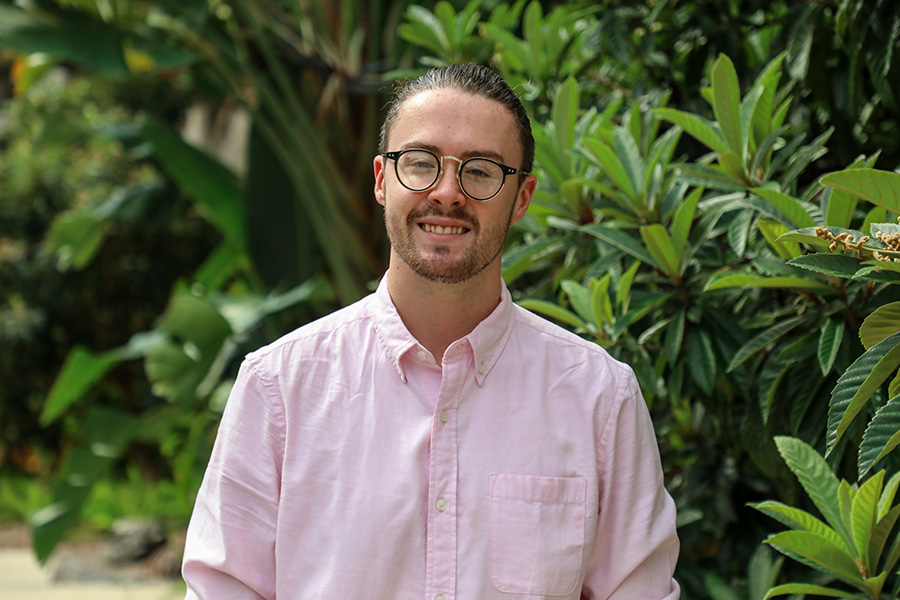Data Science in Detail: Oran O'Connor

Oran O’Connor is working toward a master’s degree in data science with a focus on statistics from the Florida State University Interdisciplinary Data Science Master’s Degree Program, part of the College of Arts and Sciences. Prior to his time at FSU, he earned an undergraduate degree from University College Cork in Cork, Ireland.
What year are you in school, and when do you expect to graduate?
Unfortunately, my time at Florida State University is coming to an end this year! I’m in my final semester of the Interdisciplinary Data Science Master’s Degree Program and will be graduating in December 2022.
Where are you from, and what made you choose FSU?
I come from a small city in Ireland called Cork, so the year-round sunshine here is a refreshing change! After I graduated with my bachelor’s degree in 2020 from University College Cork in Ireland, almost everything back home was shut down due to the COVID-19 pandemic. I decided to take a gap year and wait until I could get my master’s degree in person.
In early 2021, I found myself with an injured ankle after getting a bit overly ambitious during a snowboarding trip in Bulgaria. With no hope of even getting on a ski gondola that week, I decided to do a few hours of research and came across an article stating that FSU would be debuting its new data science master’s program in the fall. A quick Google search revealed that the university is more than happy to welcome international students, nor do they charge an arm and a leg! I definitely had a bias towards universities in the United States as I think both the supportive style and exceptional standard of academia here suits me better. All my boxes were ticked, and the rest is history.
What inspired you to choose your major and specific area of research?
Throughout school I was always a fan of mathematics-related subjects, so it made sense to continue along that path during my bachelor’s degree. I graduated with honors in mathematics, applied mathematics, and statistics – But I wanted something more to retain my interest. That’s where data science came in. After so many years of writing out rigorous proofs and elaborate statistical inferences, I needed to do something with which I knew I could make a tangible difference.
What has been your favorite thing about the Interdisciplinary Data Science Master’s Degree Program so far?
From day one I have really appreciated how helpful the staff have been, and the same goes for the Center for Global Engagement, but the main aspect that I have found beneficial has been the autonomy over which courses we take. I am able to personalize my degree to suit my strengths and interests, which is something I know a lot of similar programs can’t say.
What on-campus resources have helped you achieve success?
As an international student, the Center for Global Engagement has been very helpful to me throughout my time here with any issues I run into. Something I found invaluable on campus was the Dirac Science Library. It has been a home-away-from-home for me and when the belly starts rumbling after a long day of study the Seminole Café is only down the road. Other than that, get yourself to the games! Cheering on the college’s top-class athletes is a great way to decompress from your work. I think a lot of students here take the opportunity for free tickets for granted. Intramural sports are another great way to clear the head and have a bit of fun.
Are there any faculty or staff who have helped or inspired you? Why/how so?
Jennifer Clark, the administrative director for the Interdisciplinary Data Science Program, has been a massive help throughout the master’s degree program. She has been the perfect liaison between students and faculty and will always come to your rescue if you run into any issues.
I really enjoyed my linear algebra class with assistant professor of mathematics Tom Needham. He takes an incredibly refreshing approach to a field that is often difficult to teach. Best of all for the budding data scientists who may be new to linear algebra, he will always explain why you need to learn what you are learning and its applications.
I also had the pleasure of acting as a chairperson for the Data Science Club with Xiuwen Liu, professor and chair of the Department of Computer Science, and for the Association for Computing Machinery at FSU last year and I greatly enjoyed my time collaborating with them. The college has connections to a host of bright minds within the industry, so getting the chance to hear from them was very enriching. Going forward I’m sure Professor Liu and the others will continue to do great things to grow the club across FSU.
Following your graduation, what are your plans?
At the moment, I’m working part-time as a data science intern with Fusion Sport, a human performance optimization software company located in Colorado, while I work through the last of my classes at FSU. It has always been a dream of mine to apply my skills to the sports industry in one capacity or another. Being afforded the opportunity to cut my teeth with the Fusion team has been an outstanding experience and each day presents a new challenge. After graduation I hope to continue plying my trade as a data scientist in the sports industry.

